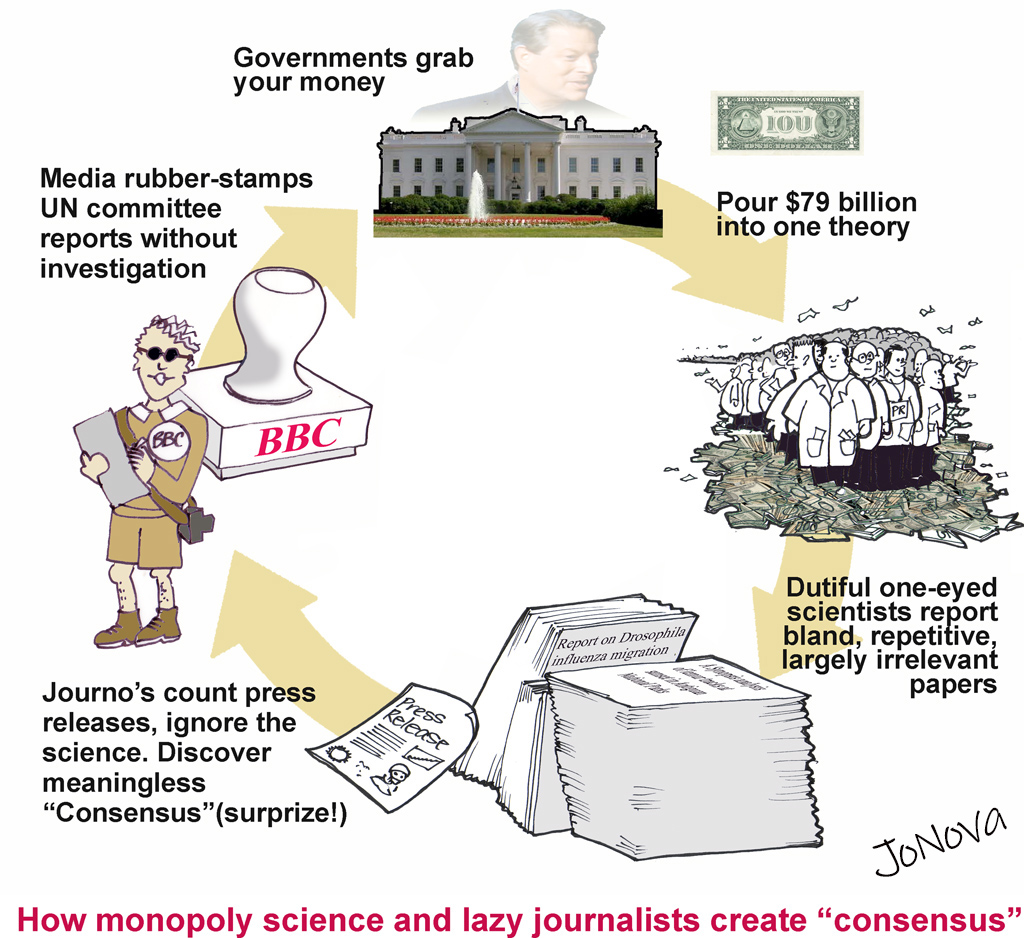By Jo Nova
The new Climate Consensus is just a junk keyword survey.
Climate change is a branch of science that’s immature, complex, and has error bars a hundred miles wide. If 99% of scientists say the same thing, it’s a cult, not a science. The climate is not man-made but the irrelevant consensus surely is.
By studying words in industry publications, Mark Lynas thinks he’s discovered a scientific truth. Instead he has just shown that skeptics get purged from peer review. It’s official now, 99% of peer reviewed articles have to say they believe in order to get published.
He thought he was doing climate science but instead he studied sociology. If Mark Lynas proved anything it’s that he doesn’t know what science is, and only unskeptical papers pass peer review. It’s a sad sad statement about the state of the scientific-industry.
Hypothetically, if we cared at all about unscientific opinion-polling of climate scientists, we’d just opinion-poll them. He could run up a survey and email it out. It’d still be a fallacy, but at least it would tell us what scientists thought. Instead, Mark Lynas and co have taken a long roundabout route to poll them by proxy. It’s the oddly hard-work-way to get an answer to a profoundly unscientific question that shouldn’t be asked in the first place. Science is not a democracy. No one votes for the Laws of Physics. They just are, and always were, whether or not the government funded the grant, the scientist wrote that up in an abstract, and some editor approved.
Fifty shades of nonsense
So Lynas et al, took 88,125 papers and randomly picked 3,000 of them, because they didn’t know enough climate science to pick out the 100 papers that matter instead. Having picked out 3,000 random papers they hunted for keywords in the abstracts to “find” skeptical papers. But there are human hands all over this gonzo chain of cause and effect. In the glorious age of Climate Witchcraft good scientists want to hide their opinions because they don’t want to be excommunicated, hounded, ignored, and never given a government grant again. Who wants a RICO? And if a scientist hid their skepticism in subclauses, tables, graphs or the 90% of the paper that isn’t the abstract, the dumb-word finder isn’t going to find them. Indeed the authors could hide their opinions just with novel keywords and the computer would miss that too.
So if Governments only gave grants to find a crisis, they’d create a market for crisis science and crisis journals. And if counter opinions were sacked, exiled, mocked and ignored, and their papers were delayed, rejected, or just edited to bury awkward results, how exactly would a keyword survey of their abstracts prove anything about upper tropospheric moist adiabatic lapse rates? At best, it’s only telling us about moist bureaucratic grant rates.
Most of these papers were not even about “attribution” or cause and effect, they were about the impacts of climate change which means the scientists who wonder if future spotted froglets will sit on smaller lilypads, or eat more striped dragonflys in 2060. These are Pollenologists who study whether flowers will bloom earlier, or petals will fall off faster in a warmer world. These are biologists and psychologists who never got past first year physics and who never looked under the bonnet of a climate model.
The researchers know that but insist that the opinion of Frog psychologists tells us something about radiative physics on the third rock from the sun because, yeah, it “Seems unlikely” that biologists given golden gravy would still publish on spotted frogs if they were skeptical of models they never looked at.
For example, a majority of the papers we categorized as being about ‘impacts’ of climate change did not state a position on whether the phenomenon they were studying— the changing climate—was human-caused. It seems highly unlikely that if researchers felt sceptical about the reality of ACC they would publish numerous studies of its impacts without ever raising the question of attribution. In other words, given that most 4a (‘no position’) ratings do not either explicitly or implicitly differ from the consensus view of GHG emissions as the principal driver of climate change it does not follow in our view that these analyses should be a priori excluded from the consensus.
What seems highly unlikely is the idea that skeptical scientists would still want to work at most universities where they will get treated like dirt.
And what skeptical scientist would want to publish in IOP Science when it publishes junk like this?
Lynas is just adopting the role of the media in the Circle of Science (below). His role is to use a mountain of papers that teach us nothing-much about the real world. Through a magical process of crystal word hunting he can find the secret signal showing that CO2 controls the climate.

The Circle of Science. The Government pays money to produce the papers it wants and the media uses the paper to scare more money out of the public.
If climate scientists knew how the climate worked they wouldn’t need junk keyword surveys, they’d just predict the climate instead. We’d all know they knew what they were talking about because they wouldn’t keep making mistakes like telling us the Antarctic would warm twice as fast as the equator, that the hot spot existed, that storms would get worse, that the pause wasn’t real, the snow wouldn’t fall, and the droughts wouldn’t end.
And they wouldn’t keep cooling the past, deleting their emails, their data and their prophecies of doom.
h/t Raven, Simon.
GRRREFERENCE
Lynas et al (2021) Greater than 99% consensus on human caused climate change in the peer-reviewed scientific literature, Environ. Res. Lett. 16 114005. https://iopscience.iop.org/article/10.1088/1748-9326/ac2966/pdf



